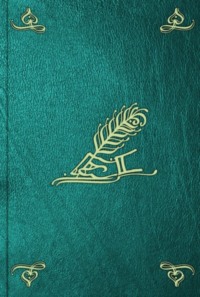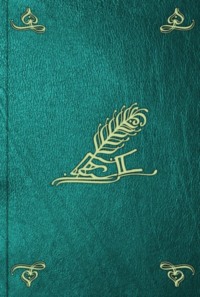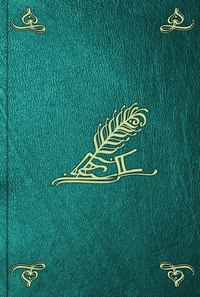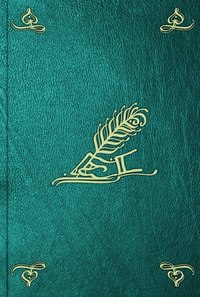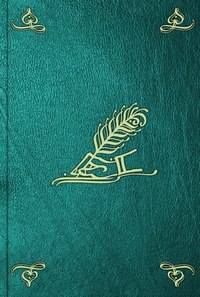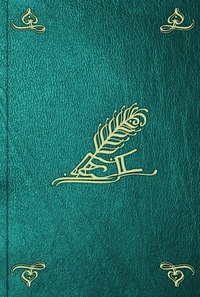 полная версия
полная версияMore Letters of Charles Darwin — Volume 1
LETTER 300. TO T.H. HUXLEY. Down, November 5th, 1880.
On reading over your excellent review (300/1. See "Nature," November 4th, 1880, page 1, a review of Volume I. of the publications of the "Challenger," to which Sir Wyville Thomson contributed a General Introduction.) with the sentence quoted from Sir Wyville Thomson, it seemed to me advisable, considering the nature of the publication, to notice "extreme variation" and another point. Now, will you read the enclosed, and if you approve, post it soon. If you disapprove, throw it in the fire, and thus add one more to the thousand kindnesses which you have done me. Do not write: I shall see result in next week's "Nature." Please observe that in the foul copy I had added a final sentence which I do not at first copy, as it seemed to me inferentially too contemptuous; but I have now pinned it to the back, and you can send it or not, as you think best, — that is, if you think any part worth sending. My request will not cost you much trouble — i.e. to read two pages, for I know that you can decide at once. I heartily enjoyed my talk with you on Sunday morning.
P.S. — If my manuscript appears too flat, too contemptuous, too spiteful, or too anything, I earnestly beseech you to throw it into the fire.
LETTER 301. CHARLES DARWIN TO THE EDITOR OF "NATURE."
(301/1. "Nature," November 11th, 1880, page 32.)
Down, November 5th, 1880.
Sir Wyville Thomson and Natural Selection.
I am sorry to find that Sir Wyville Thomson does not understand the principle of Natural Selection, as explained by Mr. Wallace and myself. If he had done so, he could not have written the following sentence in the Introduction to the Voyage of the "Challenger": "The character of the abyssal fauna refuses to give the least support to the theory which refers the evolution of species to extreme variation guided only by Natural Selection." This is a standard of criticism not uncommonly reached by theologians and metaphysicians, when they write on scientific subjects, but is something new as coming from a naturalist. Professor Huxley demurs to it in the last number of "Nature"; but he does not touch on the expression of extreme variation, nor on that of evolution being guided only by Natural Selection. Can Sir Wyville Thomson name any one who has said that the evolution of species depends only on Natural Selection? As far as concerns myself, I believe that no one has brought forward so many observations on the effects of the use and disuse of parts, as I have done in my "Variation of Animals and Plants under Domestication"; and these observations were made for this special object. I have likewise there adduced a considerable body of facts, showing the direct action of external conditions on organisms; though no doubt since my books were published much has been learnt on this head. If Sir Wyville Thomson were to visit the yard of a breeder, and saw all his cattle or sheep almost absolutely true — that is, closely similar, he would exclaim: "Sir, I see here no extreme variation; nor can I find any support to the belief that you have followed the principle of selection in the breeding of your animals." From what I formerly saw of breeders, I have no doubt that the man thus rebuked would have smiled and said not a word. If he had afterwards told the story to other breeders, I greatly fear that they would have used emphatic but irreverent language about naturalists.
(301/2. The following is the passage omitted by the advice of Huxley: see his "Life and Letters," II., page 14: —
"Perhaps it would have been wiser on my part to have remained quite silent, like the breeder; for, as Prof. Sedgwick remarked many years ago, in reference to the poor old Dean of York, who was never weary of inveighing against geologists, a man who talks about what he does not in the least understand, is invulnerable.")
LETTER 302. TO G.J. ROMANES.
(302/1. Part of this letter has been published in Mr. C. Barber's note on "Graft-Hybrids of the Sugar-Cane," in "The Sugar-Cane," November 1896.)
Down, January 1st, 1881.
I send the MS., but as far as I can judge by just skimming it, it will be of no use to you. It seems to bear on transitional forms. I feel sure that I have other and better cases, but I cannot remember where to look.
I should have written to you in a few days on the following case. The Baron de Villa Franca wrote to me from Brazil about two years ago, describing new varieties of sugar-cane which he had raised by planting two old varieties in apposition. I believe (but my memory is very faulty) that I wrote that I could not believe in such a result, and attributed the new varieties to the soil, etc. I believe that I did not understand what he meant by apposition. Yesterday a packet of MS. arrived from the Brazilian Legation, with a letter in French from Dr. Glass, Director of the Botanic Gardens, describing fully how he first attempted grafting varieties of sugar-cane in various ways, and always failed, and then split stems of two varieties, bound them together and planted them, and then raised some new and very valuable varieties, which, like crossed plants, seem to grow with extra vigour, are constant, and apparently partake of the character of the two varieties. The Baron also sends me an attested copy from a number of Brazilian cultivators of the success of the plan of raising new varieties. I am not sure whether the Brazilian Legation wishes me to return the document, but if I do not hear in three or four days that they must be returned, they shall be sent to you, for they seem to me well deserving your consideration.
Perhaps if I had been contented with my hyacinth bulbs being merely bound together without any true adhesion or rather growth together, I should have succeeded like the old Dutchman.
There is a deal of superfluous verbiage in the documents, but I have marked with pencil where the important part begins. The attestations are in duplicate. Now, after reading them will you give me your opinion whether the main parts are worthy of publication in "Nature": I am inclined to think so, and it is good to encourage science in out-of-the-way parts of the world.
Keep this note till you receive the documents or hear from me. I wonder whether two varieties of wheat could be similarly treated? No, I suppose not — from the want of lateral buds. I was extremely interested by your abstract on suicide.
LETTER 303. TO K. SEMPER. Down, February 6th, 1881.
Owing to all sorts of work, I have only just now finished reading your "Natural Conditions of Existence." (303/1. Semper's "Natural Conditions of Existence as they affect Animal Life" (International Science Series), 1881.) Although a book of small size, it contains an astonishing amount of matter, and I have been particularly struck with the originality with which you treat so many subjects, and at your scrupulous accuracy. In far the greater number of points I quite follow you in your conclusions, but I differ on some, and I suppose that no two men in the world would fully agree on so many different subjects. I have been interested on so many points, I can hardly say on which most. Perhaps as much on Geographical Distribution as on any other, especially in relation to M. Wagner. (No! no! about parasites interested me even more.) How strange that Wagner should have thought that I meant by struggle for existence, struggle for food. It is curious that he should not have thought of the endless adaptations for the dispersal of seeds and the fertilisation of flowers.
Again I was much interested about Branchipus and Artemia. (303/2. The reference is to Schmankewitsch's experiments, page 158: he kept Artemia salina in salt-water, gradually diluted with fresh-water until it became practically free from salt; the crustaceans gradually changed in the course of generations, until they acquired the characters of the genus Branchipus.) When I read imperfectly some years ago the original paper I could not avoid thinking that some special explanation would hereafter be found for so curious a case. I speculated whether a species very liable to repeated and great changes of conditions, might not acquire a fluctuating condition ready to be adapted to either conditions. With respect to Arctic animals being white (page 116 of your book) it might perhaps be worth your looking at what I say from Pallas' and my own observations in the "Descent of Man" (later editions) Chapter VIII., page 229, and Chapter XVIII., page 542.
I quite agree with what I gather to be your judgment, viz., that the direct action of the conditions of life on organisms, or the cause of their variability, is the most important of all subjects for the future. For some few years I have been thinking of commencing a set of experiments on plants, for they almost invariably vary when cultivated. I fancy that I see my way with the aid of continued self-fertilisation. But I am too old, and have not strength enough. Nevertheless the hope occasionally revives.
Finally let me thank you for the very kind manner in which you often refer to my works, and for the even still kinder manner in which you disagree with me.
With cordial thanks for the pleasure and instruction which I have derived from your book, etc.
LETTER 304. TO COUNT SAPORTA. Down, February 13th, 1881.
I received a week or two ago the work which you and Prof. Marion have been so kind as to send me. (304/1. Probably "L'Evolution du Regne vegetal," I. "Cryptogames," Saporta & Marion, Paris, 1881.) When it arrived I was much engaged, and this must be my excuse for not having sooner thanked you for it, and it will likewise account for my having as yet read only the preface.
But I now look forward with great pleasure to reading the whole immediately. If I then have any remarks worth sending, which is not very probable, I will write again. I am greatly pleased to see how boldly you express your belief in evolution, in the preface. I have sometimes thought that some of your countrymen have been a little timid in publishing their belief on this head, and have thus failed in aiding a good cause.
LETTER 305. TO R.G. WHITEMAN. Down, May 5th, 1881.
In the first edition of the "Origin," after the sentence ending with the words "...insects in the water," I added the following sentence: —
"Even in so extreme a case as this, if the supply of insects were constant, and if better adapted competitors did not already exist in the country, I can see no difficulty in a race of bears being rendered by Natural Selection more and more aquatic in their structures and habits, with larger and larger mouths, till a creature was produced as monstrous as a whale." (305/1. See Letters 110 and 120.)
This sentence was omitted in the subsequent editions, owing to the advice of Prof. Owen, as it was liable to be misinterpreted; but I have always regretted that I followed this advice, for I still think the view quite reasonable.
LETTER 306. TO A. HYATT. Down, May 8th, 1881.
I am much obliged for your kind gift of "The Genesis, etc." (306/1. "The Genesis of the Tertiary Species of Planorbis," in the "Boston Soc. Nat. Hist. Anniversary Mem." 1880.), which I shall be glad to read, as the case has always seemed to me a very curious one. It is all the kinder in you to send me this book, as I am aware that you think that I have done nothing to advance the good cause of the Descent-theory. (306/2. The above caused me to write a letter expressing a feeling of regret and humiliation, which I hope is still preserved, for certainly such a feeling, caused undoubtedly by my writings, which dealt too exclusively with disagreements upon special points, needed a strong denial. I have used the Darwinian theory in many cases, especially in explaining the preservation of differences; and have denied its application only in the preservation of fixed and hereditary characteristics, which have become essentially homologous similarities. (Note by Prof. Hyatt.))
(306/3. We have ventured to quote the passage from Prof. Hyatt's reply, dated May 23rd, 1881: —
"You would think I was insincere, if I wrote you what I really felt with regard to what you have done for the theory of Descent. Perhaps this essay will lead you to a more correct view than you now have of my estimate, if I can be said to have any claim to make an estimate of your work in this direction. You will not take offence, however, if I tell you that your strongest supporters can hardly give you greater esteem and honour. I have striven to get a just idea of your theory, but no doubt have failed to convey this in my publications as it ought to be done."
We find other equally strong and genuine expressions of respect in Prof. Hyatt's letters.)
LETTER 307. TO LORD FARRER.
(307/1. Mr. Graham's book, the "Creed of Science," is referred to in "Life and Letters," I., page 315, where an interesting letter to the author is printed. With regard to chance, Darwin wrote: "You have expressed my inward conviction, though far more clearly and vividly than I could have done, that the universe is not the result of chance.")
Down, August 28th, 1881.
I have been much interested by your letter, and am glad that you like Mr. Graham's book...(307/2. In Lord Farrer's letter of August 27th he refers to the old difficulty, in relation to design, of the existence of evil.)
Everything which I read now soon goes out of my head, and I had forgotten that he implies that my views explain the universe; but it is a most monstrous exaggeration. The more one thinks the more one feels the hopeless immensity of man's ignorance. Though it does make one proud to see what science has achieved during the last half-century. This has been brought vividly before my mind by having just read most of the proofs of Lubbock's Address for York (307/3. Lord Avebury was President of the British Association in 1881.), in which he will attempt to review the progress of all branches of science for the last fifty years.
I entirely agree with what you say about "chance," except in relation to the variations of organic beings having been designed; and I imagine that Mr. Graham must have used "chance" in relation only to purpose in the origination of species. This is the only way I have used the word chance, as I have attempted to explain in the last two pages of my "Variation under Domestication."
On the other hand, if we consider the whole universe, the mind refuses to look at it as the outcome of chance — that is, without design or purpose. The whole question seems to me insoluble, for I cannot put much or any faith in the so-called intuitions of the human mind, which have been developed, as I cannot doubt, from such a mind as animals possess; and what would their convictions or intuitions be worth? There are a good many points on which I cannot quite follow Mr. Graham.
With respect to your last discussion, I dare say it contains very much truth; but I cannot see, as far as happiness is concerned, that it can apply to the infinite sufferings of animals — not only those of the body, but those of the mind — as when a mother loses her offspring or a male his female. If the view does not apply to animals, will it suffice for man? But you may well complain of this long and badly-expressed note in my dreadfully bad handwriting.
The death of my brother Erasmus is a very heavy loss to all of us in this family. He was so kind-hearted and affectionate. Nor have I ever known any one more pleasant. It was always a very great pleasure to talk with him on any subject whatever, and this I shall never do again. The clearness of his mind always seemed to me admirable. He was not, I think, a happy man, and for many years did not value life, though never complaining. I am so glad that he escaped very severe suffering during his last few days. I shall never see such a man again.
Forgive me for scribbling this way, my dear Farrer.
LETTER 308. TO G.J. ROMANES.
(308/1. Romanes had reviewed Roux's "Struggle of Parts in the Organism" in "Nature," September 20th, 1881, page 505. This led to an attack by the Duke of Argyll (October 20th, page 581), followed by a reply by Romanes (October 27th, page 604), a rejoinder by the Duke (November 3rd, page 6), and finally by the letter of Romanes (November 10th, page 29) to which Darwin refers. The Duke's "flourish" is at page 7: "I wish Mr. Darwin's disciples would imitate a little of the dignified reticence of their master. He walks with a patient and a stately step along the paths of conscientious observation, etc., etc.")
Down, November 12th, 1881.
I must write to say how very much I admire your letter in the last "Nature." I subscribe to every word that you say, and it could not be expressed more clearly or vigorously. After the Duke's last letter and flourish about me I thought it paltry not to say that I agreed with what you had said. But after writing two folio pages I find I could not say what I wished to say without taking up too much space; and what I had written did not please me at all, so I tore it up, and now by all the gods I rejoice that I did so, for you have put the case incomparably better than I had done or could do.
Moreover, I hate controversy, and it wastes much time, at least with a man who, like myself, can work for only a short time in a day. How in the world you get through all your work astonishes me.
Now do not make me feel guilty by answering this letter, and losing some of your time.
You ought not to swear at Roux's book, which has led you into this controversy, for I am sure that your last letter was well worth writing — not that it will produce any effect on the Duke.
LETTER 309. TO J. JENNER WEIR.
(309/1. On December 27th, 1881, Mr. Jenner Weir wrote to Mr. Darwin: "After some hesitation in lieu of a Christmas card, I venture to give you the return of some observations on mules made in Spain during the last two years...It is a fact that the sire has the prepotency in the offspring, as has been observed by most writers on that subject, including yourself. The mule is more ass-like, and the hinny more horse-like, both in the respective lengths of the ears and the shape of the tail; but one point I have observed which I do not remember to have met with, and that is that the coat of the mule resembles that of its dam the mare, and that of the hinny its dam the ass, so that in this respect the prepotency of the sexes is reversed." The hermaphroditism in lepidoptera, referred to below, is said by Mr. Weir to occur notably in the case of the hybrids of Smerinthus populi-ocellatus.)
Down, December 29th, 1881.
I thank you for your "Christmas card," and heartily return your good wishes. What you say about the coats of mules is new to me, as is the statement about hermaphroditism in hybrid moths. This latter fact seems to me particularly curious; and to make a very wild hypothesis, I should be inclined to account for it by reversion to the primordial condition of the two sexes being united, for I think it certain that hybridism does lead to reversion.
I keep fairly well, but have not much strength, and feel very old.
LETTER 310. TO R. MELDOLA. Down, February 2nd, 1882.
I am very sorry that I can add nothing to my very brief notice, without reading again Weismann's work and getting up the whole subject by reading my own and other books, and for so much labour I have not strength. I have now been working at other subjects for some years, and when a man grows as old as I am, it is a great wrench to his brain to go back to old and half-forgotten subjects. You would not readily believe how often I am asked questions of all kinds, and quite lately I have had to give up much time to do a work, not at all concerning myself, but which I did not like to refuse. I must, however, somewhere draw the line, or my life will be a misery to me.
I have read your preface, and it seems to me excellent. (310/1. "Studies in the Theory of Descent." By A. Weismann. Translated and Edited by Raphael Meldola; with a Prefatory Notice by C. Darwin and a Translator's Preface. See Letter 291.) I am sorry in many ways, including the honour of England as a scientific country, that your translation has as yet sold badly. Does the publisher or do you lose by it? If the publisher, though I shall be sorry for him, yet it is in the way of business; but if you yourself lose by it, I earnestly beg you to allow me to subscribe a trifle, viz., ten guineas, towards the expense of this work, which you have undertaken on public grounds.
LETTER 311. TO W. HORSFALL. Down, February 8th, 1882.
In the succession of the older Formations the species and genera of trilobites do change, and then they all die out. To any one who believes that geologists know the dawn of life (i.e., formations contemporaneous with the first appearance of living creatures on the earth) no doubt the sudden appearance of perfect trilobites and other organisms in the oldest known life-bearing strata would be fatal to evolution. But I for one, and many others, utterly reject any such belief. Already three or four piles of unconformable strata are known beneath the Cambrian; and these are generally in a crystalline condition, and may once have been charged with organic remains.
With regard to animals and plants, the locomotive spores of some algae, furnished with cilia, would have been ranked with animals if it had not been known that they developed into algae.
LETTER 312. TO JOHN COLLIER. Down, February 16th, 1882.
I must thank you for the gift of your Art Primer, which I have read with much pleasure. Parts were too technical for me who could never draw a line, but I was greatly interested by the whole of the first part. I wish that you could explain why certain curved lines and symmetrical figures give pleasure. But will not your brother artists scorn you for showing yourself so good an evolutionist? Perhaps they will say that allowance must be made for him, as he has allied himself to so dreadful a man as Huxley. This reminds me that I have just been reading the last volume of essays. By good luck I had not read that on Priestley (312/1. "Science and Culture, and other Essays": London, 1881. The fifth Essay is on Joseph Priestley (page 94).), and it strikes me as the most splendid essay which I ever read. That on automatism (312/2. Essay IX. (page 199) is entitled "On the Hypothesis that Animals are Automata, and its history.") is wonderfully interesting: more is the pity, say I, for if I were as well armed as Huxley I would challenge him to a duel on this subject. But I am a deal too wise to do anything of the kind, for he would run me through the body half a dozen times with his sharp and polished rapier before I knew where I was. I did not intend to have scribbled all this nonsense, but only to have thanked you for your present.
Everybody whom I have seen and who has seen your picture of me is delighted with it. I shall be proud some day to see myself suspended at the Linnean Society. (312/3. The portrait painted by Mr. Collier hangs in the meeting-room of the Linnean Society.)
CHAPTER 1.VI. — GEOGRAPHICAL DISTRIBUTION, 1843-1867
LETTER 313. TO J.D. HOOKER. Down, Tuesday {December 12th, 1843}.
I am very much obliged to you for your interesting letter. I have long been very anxious, even for as short a sketch as you have kindly sent me of the botanical geography of the southern hemisphere. I shall be most curious to see your results in detail. From my entire ignorance of Botany, I am sorry to say that I cannot answer any of the questions which you ask me. I think I mention in my "Journal" that I found my old friend the southern beech (I cannot say positively which species), on the mountain-top, in southern parts of Chiloe and at level of sea in lat. 45 deg, in Chonos Archipelago. Would not the southern end of Chiloe make a good division for you? I presume, from the collection of Brydges and Anderson, Chiloe is pretty well-known, and southward begins a terra incognita. I collected a few plants amongst the Chonos Islands. The beech being found here and peat being found here, and general appearance of landscape, connects the Chonos Islands and T. del Fuego. I saw the Alerce (313/1. "Alerse" is the local name of a South American timber, described in Capt. King's "Voyages of the 'Adventure' and 'Beagle,'" page 281, and rather doubtfully identified with Thuja tetragona, Hook. ("Flora Antarctica," page 350.)) on mountains of Chiloe (on the mainland it grows to an enormous size, and I always believed Alerce and Araucaria imbricata to be identical), but I am ashamed to say I absolutely forget all about its appearance. I saw some Juniper-like bush in T. del Fuego, but can tell you no more about it, as I presume that you have seen Capt. King's collection in Mr. Brown's possession, provisionally for the British Museum. I fear you will be much disappointed in my few plants: an ignorant person cannot collect; and I, moreover, lost one, the first, and best set of the Alpine plants. On the other hand, I hope the Galapagos plants (313/2. See "Life and Letters," II., pages 20, 21, for Sir J.D. Hooker's notes on the beginning of his friendship with Mr. Darwin, and for the latter's letter on the Galapagos plants being placed in Hooker's hands.) (judging from Henslow's remarks) will turn out more interesting than you expect. Pray be careful to observe, if I ever mark the individual islands of the Galapagos Islands, for the reasons you will see in my "Journal." Menzies and Cumming were there, and there are some plants (I think Mr. Bentham told me) at the Horticultural Society and at the British Museum. I believe I collected no plants at Ascension, thinking it well-known.



